Your Kitchen's Secret Enemy: Hidden Inflammation Triggers to Watch For
9. Gluten - The Grainy Suspect

Gluten, a protein found in wheat, barley, and rye, can be a source of inflammation for individuals with celiac disease or gluten sensitivity. For these individuals, consuming gluten triggers an immune response that leads to inflammation and damage to the intestinal lining. Even in the absence of celiac disease, some people may experience non-celiac gluten sensitivity, resulting in symptoms such as bloating, fatigue, and joint pain. If you suspect gluten may be contributing to inflammation, consider trying a gluten-free diet and monitoring your symptoms. By identifying and addressing any gluten-related sensitivities, you can help reduce inflammation and improve digestive health.
10. Nightshade Vegetables - The Solanine Suspicion

Nightshade vegetables, including tomatoes, peppers, eggplants, and potatoes, contain a compound called solanine, which some individuals believe can contribute to inflammation. While research on the inflammatory effects of nightshades is limited, anecdotal evidence suggests that some people with autoimmune conditions, such as rheumatoid arthritis, may experience worsened symptoms after consuming these vegetables. If you suspect nightshades may be contributing to inflammation, consider eliminating them from your diet for a period and observing any changes in symptoms. By identifying and addressing any sensitivities to nightshades, you can help reduce inflammation and support overall health.
